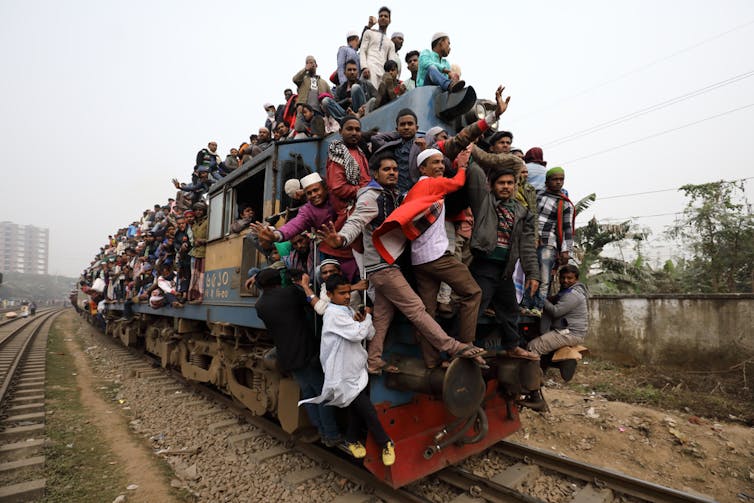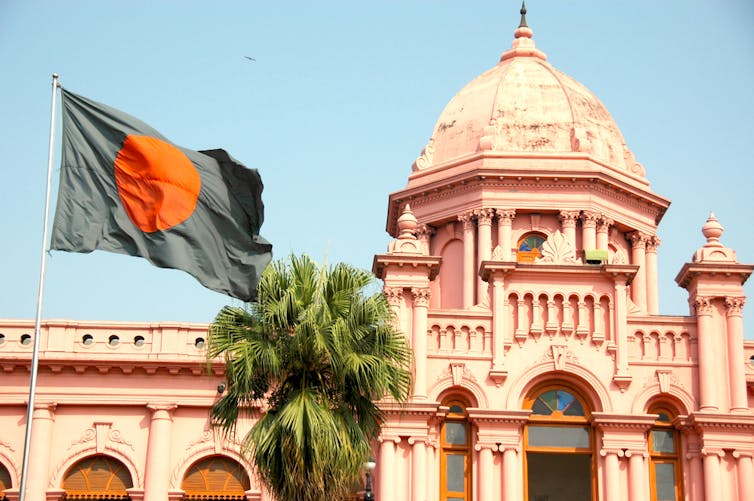
Antonio Savoia, University of Manchester and M Niaz Asadullah, University of Malaya
Bangladesh has been a development success story in recent years. The country made remarkable progress in poverty alleviation prior to the Millennium Development Goal (MDG) deadline of 2015 and has over performed on multiple social indicators, such as education, health and fertility. According to the United Nations (UN), Bangladesh has progressed so much that it has now fulfilled the criteria to graduate from a “least developed country” to a “developing country”.
But, following the recent general election, which saw the prime minister, Sheikh Hasina, win a third term, what are the chances of these development trends being sustained and progressing even further?
Recent years have seen Bangladesh regress towards authoritarian rule. In 2011, the established political tradition of organising inclusive and peaceful elections under a non-partisan caretaker government was scrapped, while the 2014 general election was boycotted by the largest opposition party leaving more than half of the parliamentary seats uncontested. During the most recent election, government security forces launched a brutal crackdown on the opposition whose members also responded with violence. There were also claims the vote was rigged. An independent survey by Transparency International confirmed major irregularities, including ballot stuffing in 47 out of 50 sample constituencies.
The ruling Awami League (AL) government has faced little opposition in the Bangladeshi parliament and has consolidated its power with violent repression. Political opponents have “disappeared” and leaders of parties outside the ruling coalition have been jailed. In early 2018, for example, opposition leader and former prime minister Khaleda Zia was sentenced to seven years imprisonment on corruption charges that some claim were politically motivated. Peaceful protests by students demanding better road safety rules and equitable access to government jobs have been violently repressed, and there have been attacks on journalists and photographers covering events.
What now?
So what does this drift towards autocracy mean for the country’s future? Since 2015, the Sustainable Development Goals (SDGs) have replaced the MDGs as the means to end multiple inequalities by 2030. It is widely believed that the long-term success of the SDGs hinges on improving the quality of government around the world. In fact, this is so important that building effective, accountable and inclusive institutions is now a development goal in its own right – Goal 16.
Key to achieving this is to have mechanisms in place to hold governments to account. Parliament, the judiciary, the media and voters should be able to hold the executive power to clearly defined limits and standards. If those who rule aren’t subject to effective checks and balances, they can abuse their privileges to maintain power.
Recent events suggest that the Bangladeshi government is moving in the opposite direction. And the cost, in terms of damaging development prospects, could be significant. In systems where there are weaker mechanisms to hold the government to account, for example, corruption in the public sector may be rife and state institutions less effective.
There are already worrying signs. Bangladesh has once again returned to the global list of the most corrupt nations and was ranked 13th from the bottom among 180 countries by Transparency International. But it topped the list of countries with the fastest growing number of ultra-wealthy citizens.
Widespread corruption is benefiting some political cronies, who have siphoned off billions of dollars from national coffers. This is likely to undermine social cohesion and further weaken popular support for the country’s authoritarian regime – especially if income inequality rises, while the rate of poverty decline slows down.

Our recent research provides an assessment of the consequences of having effective states with respect to income poverty eradication. In particular, we’ve found that countries with the most state capacity – the capability of the state machine to design and deliver policies – reduce income poverty faster, up to twice the speed of those with the least.
Despite some welcome development advances, state capacity in Bangladesh is now weak. Global surveys on public sector efficiency and the quality of legal infrastructure rank Bangladesh as a state with weak capacity – and this can have further economic consequences. Recent cross-country evidence has confirmed that democracy has a significant positive effect on economic growth in the long run. Consequently, in Bangladesh, poor state capacity and democratic backsliding may well become significant constraints on economic growth and, in turn, inhibit the possibility of the country transitioning to an upper middle-income nation by 2040.
Bangladesh has made impressive progress in economic and social development and surprised many by growing its GDP at 6% per year since at least 2015. But if the Amawi League wants to consolidate these gains and make further improvements in Bangladesh, it must reverse the recent democratic decline.
Antonio Savoia, Senior Lecturer in Development Economics, University of Manchester and M Niaz Asadullah, Professor of Development Economics, University of Malaya
This article is republished from The Conversation under a Creative Commons license. Read the original article.
Published on 28 February 2019
